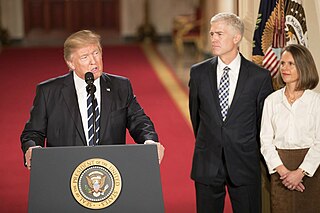| The 2016 term of the Supreme Court of the United States began October 3, 2016, and concluded October 1, 2017. This was the twenty-fourth term of Associate Justice Ruth Bader Ginsburg's tenure on the Court. |  | ||||||||||||||||||||||||||||||
| |||||||||||||||||||||||||||||||
| The 2016 term of the Supreme Court of the United States began October 3, 2016, and concluded October 1, 2017. This was the twenty-fourth term of Associate Justice Ruth Bader Ginsburg's tenure on the Court. |  | ||||||||||||||||||||||||||||||
| |||||||||||||||||||||||||||||||

The Supreme Court of the United States (SCOTUS) is the highest court in the federal judiciary of the United States. It has ultimate appellate jurisdiction over all U.S. federal court cases, and over state court cases that turn on questions of U.S. constitutional or federal law. It also has original jurisdiction over a narrow range of cases, specifically "all Cases affecting Ambassadors, other public Ministers and Consuls, and those in which a State shall be Party." The court holds the power of judicial review: the ability to invalidate a statute for violating a provision of the Constitution. It is also able to strike down presidential directives for violating either the Constitution or statutory law.

The Roberts Court is the time since 2005 during which the Supreme Court of the United States has been led by John Roberts as Chief Justice. Roberts succeeded William Rehnquist as Chief Justice after Rehnquist's death.

Neil McGill Gorsuch is an American jurist who serves as an associate justice of the Supreme Court of the United States. He was nominated by President Donald Trump on January 31, 2017, and has served since April 10, 2017.

With the advice and consent of the United States Senate, the president of the United States appoints the members of the Supreme Court of the United States, which is the highest court of the federal judiciary of the United States. Following his victory in the 2016 presidential election, Republican Donald Trump took office as president on January 20, 2017, and faced an immediate vacancy on the Supreme Court due to the February 2016 death of Associate Justice Antonin Scalia.

The 2016 term of the Supreme Court of the United States began October 3, 2016, and concluded October 1, 2017. The table below illustrates which opinion was filed by each justice in each case and which justices joined each opinion.

The Supreme Court of the United States handed down nine per curiam opinions during its 2016 term, which began October 3, 2016 and concluded October 1, 2017.

On January 31, 2017, soon after taking office, President Donald Trump, a Republican, nominated Neil Gorsuch for Associate Justice of the Supreme Court of the United States to succeed Antonin Scalia, who had died almost one year earlier. Then-president Barack Obama, a Democrat, nominated Merrick Garland to succeed Scalia on March 16, 2016, but the Republican-controlled U.S. Senate did not vote on the nomination. Majority leader Mitch McConnell declared that as the presidential election cycle had already commenced, it made the appointment of the next justice a political issue to be decided by voters. The Senate Judiciary Committee refused to consider the Garland nomination, thus keeping the vacancy open through the end of Obama's presidency on January 20, 2017.
Trinity Lutheran Church of Columbia, Inc. v. Comer, 582 U.S. ___ (2017), was a case in which the Supreme Court of the United States held that a Missouri program that denied a grant to a religious school for playground resurfacing, while providing grants to similarly situated non-religious groups, violated the freedom of religion guaranteed by the Free Exercise Clause of the First Amendment to the United States Constitution.

The Supreme Court of the United States handed down sixteen per curiam opinions during its 2017 term, which began October 2, 2017, and concluded September 30, 2018.
Sessions v. Dimaya, 584 U.S. 148 (2018), was a United States Supreme Court case in which the Court held that 18 U.S.C. § 16(b), a statute defining certain "aggravated felonies" for immigration purposes, is unconstitutionally vague. The Immigration and Nationality Act (INA) classifies some categories of crimes as "aggravated felonies", and immigrants convicted of those crimes, including those legally present in the United States, are almost certain to be deported. Those categories include "crimes of violence", which are defined by the "elements clause" and the "residual clause". The Court struck down the "residual clause", which classified every felony that, "by its nature, involves a substantial risk" of "physical force against the person or property" as an aggravated felony.

The Supreme Court of the United States handed down ten per curiam opinions during its 2019 term, which began October 7, 2019 and concluded October 4, 2020.

The Supreme Court of the United States handed down fourteen per curiam opinions during its 2020 term, which began October 5, 2020 and concluded October 3, 2021.

The Supreme Court of the United States handed down eight per curiam opinions during its 2021 term, which began October 4, 2021 and concluded October 2, 2022.
Kennedy v. Bremerton School District, 597 U.S. 507 (2022), is a landmark decision by the United States Supreme Court in which the Court held, 6–3, that the government, while following the Establishment Clause, may not suppress an individual from engaging in personal religious observance, as doing so would violate the Free Speech and Free Exercise Clauses of the First Amendment.